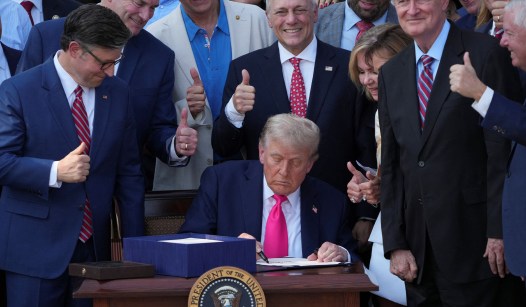Trump Enacts Landmark GOP Bill to Secure Legislative Legacy

The passage of the Republican Party’s sweeping tax and spending legislation marks a pivotal moment in President Donald Trump’s administration, capping months of intense negotiations and political maneuvering. Signed into law at a White House ceremony on Friday, the bill represents one of the most significant legislative achievements of his presidency, aligning with Trump’s goal to deliver transformative policy by July 4.
The legislation is a culmination of hard-fought efforts by GOP leadership, particularly House Speaker Mike Johnson (R., La.) and Senate Majority Leader John Thune (R., S.D.), who had to navigate deep ideological rifts within their own party. Despite internal divisions, both chambers narrowly passed the bill, with Vice President JD Vance casting the tiebreaking vote in the Senate and only minimal Republican dissent in the House.
At its core, the bill extends and makes permanent the 2017 Trump-era tax cuts while introducing new temporary tax incentives for overtime pay, tips, and seniors. These provisions were central to Trump’s campaign promises, reinforcing his economic vision for American workers and families. The package also includes a major boost in funding for Immigration and Customs Enforcement, reflecting the administration’s focus on border security, alongside modest increases in defense spending.
One of the most contentious aspects of the bill involves changes to entitlement programs. Medicaid eligibility for illegal immigrants is being removed, and work requirements are introduced for able-bodied adults. Similar reforms are applied to the Supplemental Nutrition Assistance Program (SNAP), sparking fierce debate over the potential impact on low-income Americans.
To appease moderate Republicans from high-tax states like New York and California, the legislation raises the state and local tax deduction (SALT) cap to $40,000 for five years, with phaseouts for those earning more than $500,000 annually. This compromise was essential to securing the votes needed for passage.
The bill also delivers a major win for pro-life advocates by defunding Planned Parenthood for one year, potentially leading to the closure of nearly 200 clinics nationwide. In response, Planned Parenthood has already signaled its intent to sue the administration, setting the stage for legal battles ahead.
Additional provisions include the gradual elimination of green energy tax credits established under the Democrats’ 2022 climate agenda, a slight expansion of the child tax credit, higher taxes on large university endowments, and the creation of “Trump accounts” — investment vehicles for newborns allowing parents to invest in the stock market.
Critics have raised concerns about the long-term fiscal implications of the bill, citing the Congressional Budget Office's projection that it would add $3.3 trillion to the deficit over ten years. However, Republicans argue that this estimate assumes the expiration of temporary tax cuts, which they intend to make permanent. They advocate using an alternative methodology known as the “current policy baseline,” which paints a more favorable fiscal picture but has been dismissed by Democrats as misleading.
In the House, the bill passed by a razor-thin margin, 218–214, with opposition coming from both sides of the aisle. Lawmakers Thomas Massie (Ky.) and Brian Fitzpatrick (Pa.) joined Democrats in voting against the measure, though for differing reasons. The procedural hurdles were immense, culminating in the longest vote in House history as GOP leaders worked to secure support.
Senate Republicans faced similar challenges, overcoming internal resistance from figures like Rand Paul (R., Ky.), Thom Tillis (R., N.C.), and Susan Collins (R., Me.), who opposed the bill due to concerns over Medicaid reductions and the debt ceiling increase.
GOP leadership hailed the bill as "generational legislation" that will reshape the American economy, strengthen national security, and streamline government operations. Thune emphasized the collaborative nature of the effort, crediting the White House, House GOP, and Senate Republicans for uniting behind a shared vision.
Democrats, however, have sharply criticized the legislation, accusing Republicans of redistributing resources from vulnerable populations to benefit the wealthy. They plan to use the Medicaid and SNAP reforms as key talking points heading into the 2026 midterm elections, aiming to reposition themselves as defenders of social welfare programs.
As the nation absorbs the implications of this sweeping legislation, it remains to be seen how these policies will affect economic growth, federal deficits, and the lives of millions of Americans. What is clear is that the passage of this bill represents a defining moment in the Trump era, reshaping the domestic policy landscape for years to come.
Post a Comment for "Trump Enacts Landmark GOP Bill to Secure Legislative Legacy"
Post a Comment